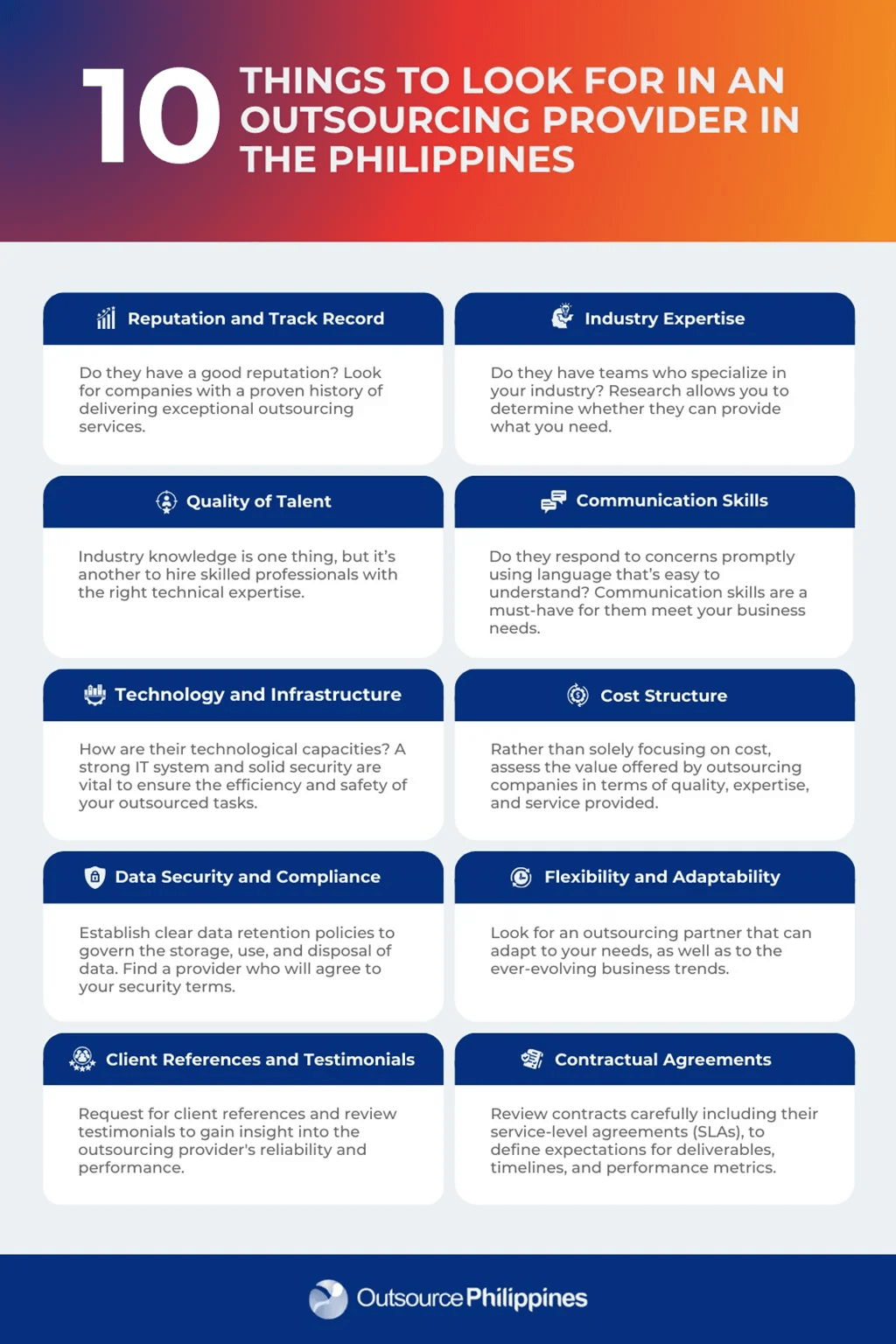Imagine tapping into a breadth of expertise, streamlined processes, and global capabilities without the hassle of managing everything in-house. This isn’t just a game-changer; it’s a business driver. Whether you’re aiming for cost savings, looking to acquire specialized skills, or expanding your global footprint, outsourcing is the secret weapon that can propel your business to new heights. And as a global hub for outsourcing, the Philippines has become a go-to partner for organizations seeking to achieve optimal efficiency.
If you’re a business owner seeking not only for assistance but also an innovative solution for your enterprise, then outsourcing in the Philippines might be what you’re looking for. Let’s take a closer look into the effects of outsourcing in the Philippines, including the pros and cons, as well as the benefits you can reap from this business solution.
What is Outsourcing?
Outsourcing is a business practice where a company contracts out certain tasks or functions to external service providers rather than handling them in-house. This strategic decision allows organizations to focus on their core competencies while leveraging the expertise of specialized external entities to perform non-core activities. Commonly outsourced functions include customer support, IT services, manufacturing, and various business processes.
The primary motivation behind outsourcing often involves cost efficiency, as companies can benefit from reduced operational expenses, access to a global talent pool, and increased flexibility in scaling their operations. As a dynamic and evolving business strategy, outsourcing continues to play a crucial role in shaping the global economy and enabling companies to adapt to changing market demands.
Related Article:
Outsourcing Definition and Everything You Need to Know About It
The BPO Industry in the Philippines
The business process outsourcing industry in the Philippines has emerged as a key player in the global outsourcing landscape. Known for its skilled English-speaking workforce, strategic geographical location, and cost-effective services, the Philippines has become a preferred destination for outsourcing operations. The BPO sector in the country encompasses a wide range of services, including customer support, technical support, back-office operations, content moderation, and information technology outsourcing.
Metro Manila and other major cities in the Philippines host numerous BPO firms, catering to clients from various industries, such as telecommunications, finance, healthcare, and ecommerce. The industry has significantly contributed to the country’s economic growth, providing employment opportunities to a large number of Filipinos and boosting foreign exchange earnings.
One of the key strengths of the Philippine BPO industry is its highly educated and adaptable workforce. The country has invested in education and training programs to ensure that its workforce possesses the necessary skills to meet the demands of diverse outsourcing tasks. The English proficiency of Filipino workers is often cited as a competitive advantage, making communication with clients from English-speaking countries smoother.
Nonetheless, the industry also faces challenges, including the need to continually upgrade skills, address infrastructure limitations, and navigate evolving global economic conditions. Despite all these, the Philippines remains a formidable force in the BPO sector, with the government and industry stakeholders working collaboratively to sustain and enhance its competitiveness on the global stage. As the industry continues to mature, it is likely to keep playing an integral role in shaping the future of the Philippines’ economic landscape.

Effects of Outsourcing in the Philippines
The effects of outsourcing in the Philippines reflect a dynamic interplay of opportunities and challenges, as the country has positioned itself as a key player in the global outsourcing landscape. Here are some of the significant benefits of outsourcing in the Philippines, as well as the potential drawbacks that warrant consideration:
Benefits of Outsourcing in the Philippines:
- Employment Opportunities: Outsourcing has been a significant source of employment in the Philippines, providing job opportunities for a large number of Filipinos. The industry has contributed to lowering unemployment rates and improving the standard of living for many.
- Economic Growth: The outsourcing sector has played a crucial role in the country’s economic growth by attracting foreign investments and generating substantial revenue through service exports. This has contributed to the overall development of the Philippine economy.
- Skills Development: Outsourcing demands a skilled workforce, leading to investments in education and training programs. The Philippines has seen an improvement in the skill set of its workforce, particularly in areas such as customer service, IT, and other BPO-related fields.
- Global Competitiveness: The Philippines has become a global outsourcing hub, attracting businesses from around the world. This has enhanced the country’s global competitiveness and positioned it as a key player in the outsourcing industry.
Drawbacks of Outsourcing in the Philippines:
- Job Insecurity: While outsourcing has created jobs, there are concerns about job security for workers in developed countries, as some companies choose to offshore jobs to countries like the Philippines to reduce costs.
- Dependency on Outsourcing: The Philippines’ economy has become somewhat dependent on the outsourcing industry. Economic shifts or changes in global outsourcing trends could potentially impact the country’s economic stability.
- Infrastructure Challenges: The rapid growth of the outsourcing industry has put pressure on infrastructure, including transportation and telecommunications. This can lead to challenges in maintaining a seamless business process.
- Potential Wage Pressures: While outsourcing provides cost advantages for businesses, there are concerns about wage pressures. The focus on cost-effectiveness could lead to lower wage growth for employees in the outsourcing sector.
Related Article:
Key Reasons Offshoring in the Philippines is a Wise Business Choice

How Can Outsourcing to the Philippines Affect Your Business?
Outsourcing to the Philippines can have a profound impact on your business, influencing various aspects ranging from cost savings to potential challenges. Here is an overview of the pros and cons of outsourcing to the Philippines:
Pros of Outsourcing to the Philippines:
Cost Efficiency
One of the primary effects of outsourcing in the Philippines concerns cost savings. Labor and operational costs in the country are often lower than in developed countries, allowing businesses to achieve significant savings without compromising the quality of work.
Skilled Workforce
The Philippines boasts of a large pool of skilled and educated professionals, particularly in fields such as customer service, IT, and business process outsourcing. The benefits of outsourcing in the Philippines include access to a talented workforce with strong English proficiency.
Time Zone Advantage
The Philippines’ time zone aligns well with Western countries, making real-time collaboration feasible. This synchronization can enhance productivity and streamline communication between your in-house team and the outsourced team.
Focus on Core Competencies
Outsourcing non-core functions to the Philippines enables your business to concentrate on its core competencies. This strategic move allows for increased efficiency and innovation within the core areas of your operations.
Global Competitiveness
Leveraging the expertise of Filipino professionals can enhance your company’s global competitiveness. The Philippines has established itself as a key player in the outsourcing industry, and aligning with this expertise can positively impact your business’s market positioning.
Cons of Outsourcing to the Philippines:
Communication Challenges
Despite high English proficiency, cultural and communication differences may still pose challenges. Ensuring effective communication and understanding cultural nuances becomes crucial to avoid misunderstandings.
Quality Control
Maintaining consistent quality standards across geographically dispersed teams can be a challenge. Establishing clear guidelines, regular monitoring, and quality control mechanisms are essential to ensuring the desired output.
Potential Legal and Regulatory Issues
Differences in legal and regulatory frameworks between your home country and the Philippines may pose challenges. Ensuring compliance with local and international laws is crucial to avoid legal issues that could affect your business.

What to Consider When Choosing an Outsourcing Provider in the Philippines
Choosing the right outsourcing provider in the Philippines is a crucial decision that can significantly impact the success of your business operations. Consider the following factors when selecting an outsourcing partner:
1. Reputation and Track Record
Research the reputation and track record of potential outsourcing providers. Look for companies with a proven history of delivering high-quality services and maintaining positive relationships with clients.
2. Industry Expertise
Assess the outsourcing provider’s expertise in your specific industry. An understanding of your industry’s nuances and requirements will contribute to a smoother collaboration and better results.
3. Quality of Talent
Evaluate the skill set and qualifications of the workforce. Look for a provider with a pool of talented professionals, including individuals with the necessary technical, language, and domain expertise.
4. Communication Skills
Effective communication is vital for successful outsourcing. Ensure that the outsourcing provider’s team has strong English proficiency and the ability to understand and fulfill your business requirements.
5. Technology and Infrastructure
Assess the provider’s technological capabilities and infrastructure. A reliable IT infrastructure, data security protocols, and the use of up-to-date technologies contribute to the efficiency and security of your outsourced processes.
6. Cost Structure
While cost savings are a primary motivation for outsourcing, it’s crucial to have a transparent understanding of the provider’s pricing structure. Consider not only the initial costs but also any potential hidden fees.
7. Data Security and Compliance
Ensure that the outsourcing provider follows robust data security measures and complies with international standards. This is particularly important when handling sensitive information and ensuring compliance with data protection regulations.
8. Flexibility and Adaptability
Look for an outsourcing partner that can adapt to your evolving business needs. Flexibility in service offerings and the ability to adjust to changes in your requirements will contribute to a successful long-term partnership.
9. Client References and Testimonials
Request and review client references and testimonials. Hearing about the experiences of other businesses that have worked with the outsourcing provider can provide valuable insights into their performance and reliability.
10. Contractual Agreements
Carefully review contractual agreements. Ensure that the terms and conditions, including service-level agreements (SLAs), are clearly defined and aligned with your business objectives. Clarify expectations regarding deliverables, timelines, and performance metrics.

Feel free to download the infographic above for your reference.
Begin Your Outsourcing Success Story with Outsource-Philippines: Take the First Step Today!
Outsource-Philippines stands out as a beacon of reliability and trustworthiness in the dynamic landscape of outsourcing solutions in the Philippines. With a proven track record of delivering exceptional services across diverse industries, Outsource-Philippines combines industry expertise with a commitment to client success. Our skilled workforce, fluent in English and well-versed in various domains, ensures seamless communication and efficient project execution.
We take pride in our state-of-the-art infrastructure and robust data security measures, guaranteeing the confidentiality of your sensitive information. What sets us apart is our unwavering dedication to understanding your unique business needs, providing scalable solutions, and fostering a collaborative environment. Contact us today to explore how we can elevate your business to new heights!












